Notes
- ↑ "Belgische Senaat" (in Dutch). Belgian Senate . Retrieved 10 June 2009.
Paul Wille | |
|---|---|
| Senator | |
| In office 5 July 2007 –13 June 2010 | |
| Personal details | |
| Nationality | Belgian |
| Political party | Open VLD |
| Residence | Eeklo |
| Website | www.paulwille.be |
Paul Wille was a Belgian senator and still is a member of the Open Flemish Liberals and Democrats. He was elected as a member of the Belgian Senate in 2007. [1]

Guy Maurice Marie Louise Verhofstadt is a Belgian politician who was the Leader of the Alliance of Liberals and Democrats for Europe from 2009 to 2019, and has been a Member of the European Parliament (MEP) from Belgium since 2009. He was the Prime Minister of Belgium from 1999 to 2008 and Deputy Prime Minister and Minister of Budget from 1985 to 1992. He was a Member of the Chamber of Representatives from 1985 to 2009.

The country of Belgium is divided into three regions. Two of these regions, the Flemish Region or Flanders, and Walloon Region, or Wallonia, are each subdivided into five provinces. The third region, the Brussels Capital Region, is not divided into provinces, as it was originally only a small part of a province itself.

Philippe or Filip is King of the Belgians. He is the eldest child of King Albert II and Queen Paola. He succeeded his father upon the latter's abdication for health reasons on 21 July 2013. He married Jonkvrouw Mathilde d'Udekem d'Acoz in 1999, with whom he has four children. Their eldest child, Princess Elisabeth, is first in the line of succession.
The National Democratie was a francophone Belgian far-right political party. The party advocated a strong unitary Belgian nationalism, strongly opposed immigration, and reached out to Flemish voters.

The Socialist Party is a social democratic French-speaking political party in Belgium. As of the 2014 elections, it is the second largest party in the Belgian Chamber of Representatives and the largest Francophone party. The party is led by Paul Magnette. The party supplies the Minister-president of the French Community, and the Brussels-Capital Region. In the German-speaking community, the party is known as the Sozialistische Partei (SP).

The Senate is the upper house of the States General, the legislature of the Netherlands. Its 75 members are elected on lists by the members of the twelve States-Provincial and three Caribbean electoral colleges for the Senate every four years, within three months of the provincial elections. All provinces and colleges have different electoral weight depending on their population.

The Belgian Federal Parliament is the bicameral parliament of Belgium. It consists of the Chamber of Representatives and the Senate. It sits in the Palace of the Nation. The Chamber of Representatives is the primary legislative body; the Senate functions only as a meeting place of the federal communities and regions.

The Senate is one of the two chambers of the bicameral Federal Parliament of Belgium, the other being the House of Representatives. It is considered to be the "upper house" of the Federal Parliament. Created in 1831 as a chamber fully equal to the Chamber of Representatives, it has undergone several reforms in the past, most notably in 1993 and 2014. The 2014 elections were the first without a direct election of senators. Instead, the new Senate is composed of members of community and regional parliaments and co-opted members. It is a chamber of the communities and regions and serves as a platform for discussion and reflection about matters between these federated entities. The Senate today plays a minor role in the federal legislative process. However, the Senate, together with the Chamber, has full competence for the Constitution and legislation on the organization and functioning of the Federal State and the federated entities. Since the reform of 2014, it holds about ten plenary sessions a year.

Elections in Belgium are organised for legislative bodies only, and not for executive functions. Direct elections take place for the European Parliament, the bicameral Federal Parliament, the Parliaments of the Communities and Regions, the provincial councils, the municipal councils and a few district councils. Voting is mandatory and all elections use proportional representation which in general requires coalition governments.

The Treaty of Accession 2005 is an agreement between the member states of European Union and Bulgaria and Romania. It entered into force on 1 January 2007. The Treaty arranged accession of Bulgaria and Romania to the EU and amended earlier Treaties of the European Union. As such it is an integral part of the constitutional basis of the European Union.

The Constitutional Court plays a central role within the federal Belgian state. This is a judicial court founded in 1980. Its jurisdiction was augmented in 1988 and 2003.

The Chamber of Representatives is one of the two chambers in the bicameral Federal Parliament of Belgium, the other being the Senate. It is considered to be the "lower house" of the Federal Parliament.

The 2007 Belgian federal election took place on Sunday 10 June 2007. Voters went to the polls in order to elect new members for the Chamber of Representatives and Senate.

The Constitution of Belgium dates back to 1831. Since then Belgium has been a parliamentary monarchy that applies the principles of ministerial responsibility for the government policy and the Trias Politica. The Constitution established Belgium as a centralised unitary state. However, since 1970, through successive state reforms, Belgium has gradually evolved into a federal state.
Marc Ernest Elisabeth Robert Juliette Verwilghen, born 21 September 1952 in Dendermonde, is a Belgian politician.

General elections were held in Belgium on 16 November 1919. Although the Belgian Labour Party received the most votes in the Chamber of Representatives elections, the Catholic Party remained the largest party in both the Chamber and the Senate. Voter turnout was 88.5% in the Chamber elections.

Wouter Beke is a Belgian politician and a member of the CD&V. He was reelected as a member of the Belgian Senate in 2007. In 2014 he became a member of the Belgian Federal House of Representatives and was reelected in 2019. In July 2019 he succeeded Kris Peeters as Federal Minister for Work, Economy and Consumer affairs. He left the Belgian Federal Government in October 2019 to become Minister for Welfare, Public health, Family and Poverty reduction in the Flemish Regional Jambon Government.
Federal elections were held in Belgium on 25 May 2014. All 150 members of the Chamber of Representatives were elected, whereas the Senate was no longer directly elected following the 2011–2012 state reform. These were the first elections held under King Philippe's reign.